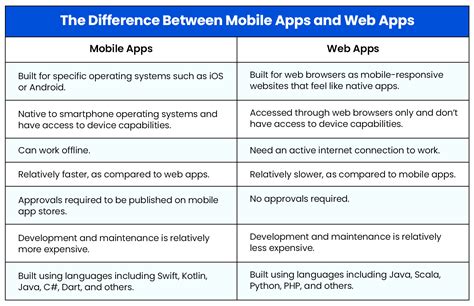Web App vs Mobile App

The debate between web apps and mobile apps has been ongoing for years, with each side having its own set of advantages and disadvantages. As technology continues to evolve, it's essential to understand the differences between these two types of applications and how they can benefit businesses and users alike. In this article, we'll delve into the world of web apps and mobile apps, exploring their unique characteristics, benefits, and drawbacks, to help you make an informed decision about which one is best suited for your needs.
Introduction to Web Apps and Mobile Apps

A web app, also known as a web application, is a software application that runs on a web browser, using web technologies such as HTML, CSS, and JavaScript. Web apps are accessible through a URL and can be used on various devices, including desktops, laptops, tablets, and smartphones. On the other hand, a mobile app, also known as a native app, is a software application designed specifically for mobile devices, such as smartphones and tablets. Mobile apps are typically downloaded and installed from app stores, such as the Apple App Store or Google Play Store.
Key Points
- Web apps are accessible through a web browser, while mobile apps are downloaded and installed from app stores.
- Web apps are platform-independent, while mobile apps are designed for specific mobile platforms.
- Web apps are often less expensive to develop and maintain than mobile apps.
- Mobile apps offer a more personalized and interactive user experience than web apps.
- Web apps are easier to update and maintain than mobile apps.
Benefits of Web Apps
One of the primary advantages of web apps is their platform independence. Since web apps run on a web browser, they can be accessed from any device, regardless of the operating system or platform. This makes web apps an excellent choice for businesses that need to reach a wide audience. Additionally, web apps are often less expensive to develop and maintain than mobile apps, as they don’t require separate coding for different platforms. Web apps also offer easier updates and maintenance, as changes can be made on the server-side without affecting the user’s experience.
| Web App Benefits | Description |
|---|---|
| Platform Independence | Accessible from any device, regardless of the operating system or platform. |
| Cost-Effective | Less expensive to develop and maintain than mobile apps. |
| Easier Updates | Changes can be made on the server-side without affecting the user's experience. |

Benefits of Mobile Apps
Mobile apps, on the other hand, offer a more personalized and interactive user experience. Since mobile apps are designed specifically for mobile devices, they can take advantage of the device’s hardware and software features, such as GPS, camera, and push notifications. Mobile apps also provide a more immersive experience, as they can be designed to be more engaging and interactive. Additionally, mobile apps can be used offline, making them an excellent choice for applications that require access to data without an internet connection.
Comparison of Web Apps and Mobile Apps

When comparing web apps and mobile apps, it’s essential to consider several factors, including development cost, maintenance, user experience, and accessibility. Web apps are generally less expensive to develop and maintain, as they don’t require separate coding for different platforms. However, mobile apps offer a more personalized and interactive user experience, making them an excellent choice for applications that require a high level of engagement. In terms of accessibility, web apps are more accessible, as they can be accessed from any device, regardless of the operating system or platform.
In conclusion, the choice between a web app and a mobile app depends on the specific needs and goals of the application. By understanding the benefits and drawbacks of each type of application, businesses and developers can make an informed decision about which one is best suited for their needs. Whether it's a web app or a mobile app, the key to success lies in providing a high-quality user experience that meets the user's needs and expectations.
What is the primary difference between a web app and a mobile app?
+The primary difference between a web app and a mobile app is that a web app runs on a web browser, while a mobile app is designed specifically for mobile devices and is downloaded and installed from app stores.
Which type of app is more accessible?
+Web apps are more accessible, as they can be accessed from any device, regardless of the operating system or platform.
What are the benefits of mobile apps?
+Mobile apps offer a more personalized and interactive user experience, can take advantage of the device's hardware and software features, and can be used offline.
Meta Description: Discover the differences between web apps and mobile apps, and learn how to choose the best option for your business needs. Explore the benefits and drawbacks of each type of application, and get expert insights on how to provide a high-quality user experience. (149 characters)



